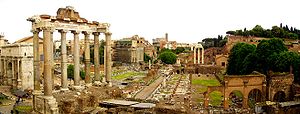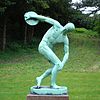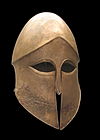- Portal:Classical Civilisation
-
- Wikipedia portals:
- Culture
- Geography
- Health
- History
- Mathematics
- Natural sciences
- People
- Philosophy
- Religion
- Society
- Technology
History: Ancient Egypt • Ancient Germanic Culture • Ancient Greece • Ancient Japan • Ancient Near East • Ancient Rome • Archaeology • Austria-Hungary • British Empire
 • Bulgarian Empire • Byzantine Empire • History of Canada • Imperial China • Classical Civilisation • Colonialism • Disasters • Heraldry • History of Science
• Bulgarian Empire • Byzantine Empire • History of Canada • Imperial China • Classical Civilisation • Colonialism • Disasters • Heraldry • History of Science • Indian independence movement • Khitan • Middle Ages • New France • Russian Empire • War
• Indian independence movement • Khitan • Middle Ages • New France • Russian Empire • War
The Classical Civilisation Portal
Classical Civilisation, also known as Classical antiquity, is a broad term for a long period of cultural history centered on the Mediterranean Sea, which begins roughly with the earliest-recorded Greek poetry of Homer (7th century BC), and continues through the rise of Alexander the Great and the Fall of the Roman Empire (5th century AD), ending in the dissolution of classical culture with the close of Late Antiquity.
Selected article
'The Odyssey' is, along with the 'Iliad', one of the two earliest pieces of Greek epic poetry to have survived, and is a story that many consider central to the evolution of Western civilization. Centred upon the eponymous hero Odysseus, it describes the adventures of the great Trojan War hero as he attempts to get home. Deprived slowly by Poseidon of men, supplies, and eventually his last ship, he struggles to return home. The book depicts Odysseus as a very human character driven by his desire to return home to his wife Penelope and his son Telemachus, whom he has not seen since he set off to war some twenty years prior.
Added drama revolves around Penelope's despair of seeing her husband again, and Odysseus' fear that she will be forced to re-marry in his absence. Additional themes include the question of how a father/son relationship is possible when neither know each other, the loyalty or otherwise of one's servants and the role of the Gods (the dilemma of being aloof and ignored, or intervening and making humans dependent).
Read More...
Selected picture

A panorama of the Forum in Rome - once the center of social and political life in ancient Italy.
Did you know
...Boris Johnson, the mayor of London, dressed in a toga to promote A Level Ancient History when it was in danger of being axed?
...that Roman law is one of the bases of the Scottish legal system?
...that Cicero's famous speech Pro Milone was ruined when Cicero had an attack of nerves delivering it, and his client Milo was forced to flee Rome for Gaul?
Featured Archaeology
Modern Baalbek in Lebanon, ancient Heliopolis, was made a colonia by the Roman Empire in 15 BC and a legion was stationed there. Work on the religious complex there lasted over a century and a half and was never completed. The dedication of the present temple ruins, the largest religious building in the entire Roman empire, dates from the reign of Septimus Severus, whose coins first show the two temples. The great courts of approach were not finished before the reigns of Caracalla and Philip. In commemoration, no doubt, of the dedication of the new sanctuaries, Severus conferred the rights of the jus italicum on the city. Today, only six Corinthian columns remain standing. Eight more were disassembled and shipped to Constantinople under Justinian's orders, for his basilica of Hagia Sophia.
The greatest of the three temples was sacred to Jupiter Baal, ("Heliopolitan Zeus"), identified here with the sun, with whom were associated a temple to Venus and a lesser temple in honor of Bacchus (though it was traditionally referred to by Neoclassical visitors as "Temple of the Sun"). Thus three Eastern deities were worshipped in Roman guise: thundering Jove, the god of storms, stood in for Baal-Hadad, Venus for ‘Ashtart (known in English as Astarte) and Bacchus for Anatolian Dionysus.
Topic News
- On 30 November 2006, the science journal Nature published a new reconstruction of the ca. 1,900-year-old Antikythera mechanism, an ancient mechanical analog computer designed to calculate astronomical positions, and a geared device of astonishing technical complexity for its period.
- The recent book Odysseus Unbound offers a compelling argument that the Odyssey's "Ithaca," the island home of cunning Odysseus, refers not to the island today known as Ithaca, but rather to the Paliki peninsula of Kefalonia, which geological changes would have transformed from island to peninsula..
Featured Quote
- Νόμος ὁ πάντων βασιλεύς
- θνατῶν τε καὶ ἀθανάτων
- ἄγει δικαιῶν τὸ βιαιότατον
- ὑπερτάτᾳ χειρί.
Pindar, fragment 169a
- Law, the king of all,
- of mortals and immortals,
- guides them as it justifies the utmost violence
- with a sovereign hand.
(translated by William H. Race)
Categories
Although major articles are listed at the bottom of this page, all classics-related articles can be found in the categories below. Note that some articles may be found in subcategories, e.g. for the Parthenon, follow the Greek architecture link, then select the Ancient Greek Structures subcategory.
Classical Studies
-
- Architecture
- Culture
- People
- Philosophy
-
- Architecture
- Culture
- People
- Philosophy
Things you can do
General tasks
- Complete standardisation for transliterating Greek.
- Confirm, when making edits to classics related pages, that spellings are disambiguated — e.g., Klytaimnestra to Clytaemnestra - many classicists accept both, depending on the translation used. See above for more help.
- Proof-read articles for grammar and spellings.
WikiProjects
- Portal:Ancient Greece
- Portal:Ancient Rome
- Portal:Egyptology
- WikiProject Classical Greece and Rome
- Classical warfare task force
General
- Ancient Greece
- Macedon
- Hellenistic Greece
- Antigonides
- Attalides
- Lagides
- Seleucid Empire
- Ptolemaic Egypt
- Greco-Bactrians
- Indo-Greeks
- Classical demography
- Roman Naming Conventions
History - Geography
- History of Ancient Greece
- Military Alliances
- Figures in Greek history
- Greek Geography
- Greek Islands
- Magna Graecia
Sites
- Greek Archaeology
- Roman Archaeology
Art
- Seven Wonders of the World
- Architecture
- Paintings
- Sculpture
- Pottery
Literature
- Lyric Poetry
- Ancient Greek theatre
-
- Greek Tragedy
- Greek comedy
- Library of Alexandria
- Latin language
- Roman Literature
- Plautus, Terence, Cicero, Catullus, Livy, Virgil, Horace, Ovid, Seneca, Lucan, Pliny[disambiguation needed
 ], Tacitus, Suetonius
], Tacitus, Suetonius
Philosophy and Sciences
- Greek astronomy
- Roman Technology
Mythology and religion
- Mythology
- Legendary creatures
- Greek Gods
- Roman Gods
- Trojan War
- Hercules
Warfare
- Greek Warfare
- Roman Warfare
- Roman Military History
- Roman military structure
Sport
Images
- Maps
- Architecture
- Pottery
- Famous Greeks
- Famous Romans
- Sculptures
Wikimedia Commons has media related to: Categories:- Portals under construction
Wikimedia Foundation. 2010.











